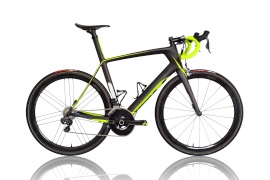More and more bicycle manufacturers are realizing that they can save themselves material defects, part breakages and serious accidents with thermographic inspections and thus meet the quality requirements of their customers. This is because defective parts and processes can be detected automatically and non-destructively: whether in development by means of laboratory testing, in production by means of random sample test stands and in large-scale series production by means of inline testing systems with short cycle times. edevis has a wide range of experience for the bicycle industry. In most cases, these are defects that are not visible to the naked eye because they are hidden inside the parts.
The problem:
Safety tests are not mandatory for bicycle production, unlike in the aircraft or automotive industries, but in an emergency they can prevent just as serious or fatal injuries! Some bicycle manufacturers are not concerned about the safety of their products until customers or employees have had an accident due to the breakage of a faulty component. By then, however, it is already too late. In order to ensure the road safety of bicycles, there are UVV, DGVU or StVZO regulations for bicycle owners and operators. For manufacturers, voluntary self-regulation also makes sense in their own interest: expensive and image-damaging recalls can be avoided in this way. Bicycle manufacturers benefit greatly from the quality assurance testing measures of edevis.
The task:
The task clearly lies in the area of quality assurance. And quality begins in bicycle production where visual inspection reaches its limits: inside the parts. The task is to completely inspect bicycle components for strength-related defects in the material or in the processing. This applies in particular to hand-made carbon components such as frames, handlebars or rims, which are tested for delamination, impacts, pores, dry spots or fiberondulation. We use thermographic testing equipment to non-destructively penetrate bicycle parts and identify defects and irregularities in depth. These systems help to ensure that development, processes and series production are free of defects.
The manufacturing processes in the bicycle industry are subject to many influencing factors, where process fluctuations can occur time and again. For example, in the production of carbon rims. Here there is a molding tool for the outer contour and an inflatable inner part, where “folding over” can easily occur and the CFRP prepregs are then not properly compressed during the curing process. This leads to delaminations in the layer structure. edevis can identify these invisible defects based on thermal contrasts and sort out critical parts before they reach final assembly and possibly even the market.
The solution:
In bicycle component inspection, edevis relies on so-called lockin thermography inspection with infrared cameras and halogen lamp excitation. The component surface is briefly confronted with heat while the camera records the heat flow behavior. The software evaluates the test results and sorts parts into “in order“ and „not in order“.” The lightweight construction of bicycle parts with hollow profiles makes for thin-walled components that can be examined very well via heat excitation. Material defects can be clearly detected based on changes in heat flow, especially at junctions where multiple profiles are connected.
The project planning:
Projects usually start with the request and sending of defective parts (handlebars, frames, rims, saddles, etc.) and at least one defect-free reference part. Then the specification of the test procedure begins (delaminations, pores, cracks, damage after use, positions of inserts, etc.). The feasibility study and budgeting conclude this phase. After that, it is time for the realization, either directly with the customer, if an in-house equipment manufacturing is available, or together with a plant manufacturer. In addition, edevis also supplies turnkey systems for the laboratory or random testing.
